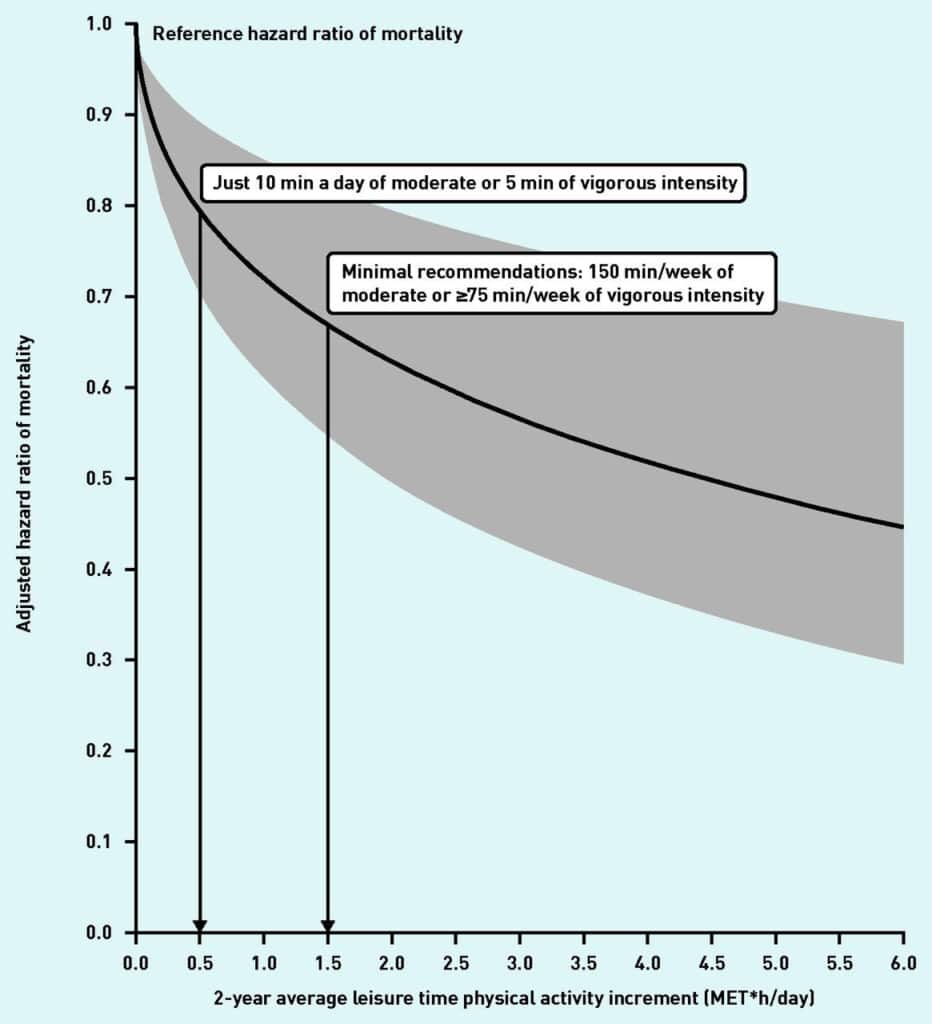You don’t need to dedicate a large chunk of time to exercise. Even just a few minutes each day can make a significant difference.

I totally get it – when work, deadlines, and personal commitments pile up, finding time for physical activity can be challenging.
But here’s the thing – we can’t downplay the importance of exercise for our overall health and well-being!
So, how can we make exercise happen even when we’re crazy busy?
The key is understanding that exercise doesn’t require spending hours in the gym or trying to fit everything in at once.
It’s about finding time-efficient ways to weave physical activity into our daily routines, turning our existing time into chances for exercise.
In this guide, we’ll explore clever and feasible hacks on how to exercise when you’re short on time.
Sounds exciting? Let’s get started!
Every Bit of Exercise, No Matter How Short, Contributes to Health
The idea that effective workouts must be lengthy is a total misconception.
According to the 2018 Physical Activity Guidelines for Americans (PAGA), engaging in moderate to vigorous physical activity of any duration contributes to health.
Even a brief workout of 10 minutes or less each day can bring substantial benefits.
A study published in the British Journal of General Practice demonstrates this.
Among the 3,357 primary care patients who were physically inactive, a remarkable decrease in mortality rates was observed among those who added just 10 minutes of moderate physical activity or 5 minutes of vigorous exercise into their daily routines, as shown in Figure 1.
Although this falls short of the recommended PAGA of 150 minutes/week of moderate or 75 minutes/week of vigorous physical activity, this finding still emphasizes the significant impact that even a tiny amount of exercise can have on overall health and longevity.
Figure 1

Note: From “Any increment in physical activity reduces mortality risk of physically inactive patients: prospective cohort study in primary care,” by G. Grandes, A. García-Alvarez, M. Ansorena, R. Sánchez-Pinilla, J. Torcal, M. Arietaleanizbeaskoa, A. Sánchez, 2022, British Journal of General Practice, 73 (726): e52-e58. DOI: https://doi.org/10.3399/BJGP.2022.0118. (Licenced under CC BY 4.0)
What Counts as Moderate to Vigorous Intensity?
According to the PAGA, you can measure the intensity of your workout by using the Talk Test.
For moderate-intensity activities, you should be able to talk but not sing, which means you’re putting in enough effort to increase your heart rate and break a sweat.
With vigorous-intensity activities, you’ll find it difficult to say more than a few words without catching your breath. This means your heart rate increases significantly, and your breathing becomes more intense.
Ultra-Efficient Exercises: Effective Workouts in Just 10 Minutes or Less
Before proceeding with any of these workouts, it’s crucial to always do a proper warm-up and cool-down to ensure a safe and practical session.
High-Intensity Interval Training (HIIT)
Tabata Training (4-minute workout)
Tabata Training is the most time-efficient workout with the highest payoff.
This form of HIIT includes 20 seconds of high-intensity exercise, followed by 10 seconds of rest, repeated eight times for 4 minutes.
Dr. Izumi Tabata, who invented this method, found it to significantly improve both anaerobic and aerobic capacity.
To experience its full effectiveness, pushing yourself to the maximum during those intense 20 seconds is crucial.
You can follow Anna’s 4-minute Tabata workout as a guide below or create your own using your preferred HIIT exercises.
30-20-10 Protocol (5-minute workout)
This method incorporates a gradual increase in intensity.
The routine begins with 30 seconds of exercise at a moderate intensity, followed by 20 seconds of higher intensity, and concludes with a final burst of maximum effort lasting 10 seconds.
This sequence is repeated to complete a quick yet highly effective 5-minute workout.
Take inspiration from the following example to create a personalized routine that aligns with your goals and needs.
Example
Round 1
30 sec
Squat
20 sec
Jump Squat
10 sec
Frog Jumps
15-sec break
Round 2
30 sec
Shoulder Taps
20 sec
Push-ups
10 sec
Explosive Push-ups
15-sec break
Round 3
30 sec
Reverse Lunges
20 sec
Reverse Pulsing Lunges
10 sec
Lunge Jumps
15-sec break
Round 4
30 sec
Run in Place
20 sec
High Knee Runs
10 sec
Tuck Jumps
15-sec break
Zuniga Regimen (10-minute workout)
This regimen entails performing 10 repetitions (reps) of high-intensity exercises for 30 seconds, followed by 30 seconds of rest.
Break Up Your Exercise Routine

You don’t need to finish your workout in one go.
Breaking up your exercise routine into smaller sessions throughout the day is a practical strategy if you have a packed schedule. This way, you’ll still get excellent results and benefits while having a more manageable routine.
For instance, let’s say you have a 60-minute strength training routine consisting of four exercises, each composed of 4 sets of 8-12 reps. Instead of performing all exercises in one go, consider splitting them.
Complete one exercise in the morning, one during your lunch break, another when you return from work or study, and the last in the evening. This flexible schedule adapts to your daily routine, and you’ll still get an effective workout.
By trying this approach, you might also notice a boost in your performance with each exercise. Breaking up your workout routine allows for proper recovery between exercises, leading to less fatigue and the ability to push out more reps, potentially enhancing muscle development and strength.
A Bite-Sized Approach to Fitness
Try Exercise Snacking: It only takes 1 minute of your time
Have you ever considered that even a minute of exercise can notably improve your overall health? This is where the concept of “exercise snacking” comes in.
As defined in a publication in the Exercise And Sport Sciences Reviews, exercise snacks are short (1 minute or less), intensive bursts of physical activity spread throughout the day.
A study published in Nature Medicine found that doing 3 brief bouts of VILPA (vigorous intermittent lifestyle physical activity) each day, lasting only 1 or 2 minutes each, can significantly lower your risk of all-cause, cancer mortality, and cardiovascular disease.
Above all, these exercise snacks are excellent for breaking up prolonged periods of inactivity throughout the day, minimizing the adverse effects of a sedentary lifestyle.
Examples of Exercise Snacking

Exercise While Waiting
Whether waiting for your coffee to brew, your food to warm up in the microwave, or your computer to update, take advantage of that time by incorporating a quick 1-minute burst of high knees, jumping squats, or your go-to exercise.

Lunch Break Exercises
Instead of sitting at your desk during lunch break, go for a brisk walk around the office building or quickly jog outside.

Stair Climb
Avoid using the elevators and rapidly climb the staircase if you have one in your office or home.

Optimize Your Screen Time
Try integrating activities such as jumping jacks or sit-ups as you take in your favorite shows or films on streaming platforms like Netflix, Disney+, or Prime. If you’re watching TV. Try doing rapid burpees for the entire commercial break.

Lunge Walk
Do some walking lunges as you make your way to and from various places within the office, such as the bathroom, kitchen, or meeting room.

Desk/Chair-Friendly Exercises
If your profession requires constant sitting, there are various exercises you can perform right at your desk.
Example
- Bulgarian split squat
- Seated single-leg squat
- Wall sits
- Incline mountain climbers
- Seated crunches
- Seated skater
- Seated alternating toe touches
- Incline push-ups
- Arm circles
- Chair dips
If you have weights with you
- Seated Arnold press
- Seated side lateral raises
- Seated front lateral raises
- Seated bicep curls
- Seated overhead tricep extensions
- Seated bent over row
Other Ways to Incorporate More Movement into Your Day

Active Commuting
Consider cycling or walking to work or school instead of driving or using public transport. If you have to drive, park a little further away from your destination, or if you are commuting by public transport, get off one or two stops early to incorporate some walking.

Active Chores
Transform your household responsibilities into a fitness regimen. Tasks such as vacuuming, doing laundry, or dusting can be great opportunities to stay active. Exert a little extra effort into these activities: increase your sweeping pace or add intensity to your scrubbing. Make the most out of your chores by turning them into a workout.

Standing Breaks
Regularly interrupt your sitting time with short standing breaks. Consider purchasing an adjustable standing desk to alternate between sitting and standing throughout your workday.

Go on Walking Dates
Instead of meeting for coffee or drinks, suggest walking with your friends or significant other. This way, you can catch up and exercise at the same time.

Create Fitness Challenges
Challenge yourself to complete 10,000 steps a day or climb a certain number of stairs each day and gradually increase this number.

Dance Breaks
Dancing is a fun and effective way to burn calories. Put on your favorite music and dance while doing your daily tasks. Not only does it offer an excellent cardio workout, but it also elevates your mood.

Bed Stretches
Start your day with a few simple stretches while still in bed. This will help wake up your muscles and get your blood flowing, setting you up for a productive day.
Tips to Stay Motivated and Consistent When Short on Time
Schedule Your Workouts
Treat exercise like a necessary appointment. If it’s scheduled, you’re more likely to stick to it.
Start by identifying pockets of time within your daily routine where physical activity can be incorporated. It could be a 5-10-minute workout session in the morning before work or study or a session before dinner.
Planning and penciling these activities into your daily schedule makes them non-negotiable, just as important as any other task or appointment.
With consistent practice, these scheduled workout sessions will soon become a habitual part of your routine, even amidst the busiest schedules.
Set Reminders
Getting caught up in the daily grind and forgetting about your workouts is easy. Set reminders on your phone or calendar for when it’s time to exercise. These gentle nudges will keep you accountable and ensure you don’t miss any workout sessions.
Reward Yourself
Boost your motivation by rewarding yourself upon reaching them.
This doesn’t necessarily mean indulging in unhealthy treats; rewards can be anything that brings you joy and serves as a positive reinforcement. This could be a relaxing spa day, a new book, a movie night, or even a new outfit.
The anticipation of the reward can be a powerful motivator, helping you stick to your fitness plan even during the busiest times.
Embrace Variety
Keeping your exercise routine diverse prevents fitness plateaus and keeps the journey exciting and enjoyable.
This variety could mean trying out different forms of exercise or simply changing the time or place of your workout.
By continuously introducing new elements into your exercise routine, you keep it fresh and more sustainable, making it an integral part of your busy daily schedule.
Find an Exercise Partner
Finding a workout buddy can significantly enhance your progress and overall experience.
Having a partner who shares your fitness goals can help keep you both accountable and motivated, making your exercise sessions more engaging and less of a chore.
Plus, these shared sessions can double as social time, making your workout routine a fun part of your day, effortlessly blending with your busy schedule.
Shift Your Mindset
Shifting your mindset about exercise is essential for prioritizing it in your busy schedule.
It’s essential to remove the mental barrier that views exercise as a separate, time-consuming entity that requires massive effort and hours at the gym.
If you redefine what counts as exercise – seeing it as an opportunity to move and be active – it can easily be incorporated into any schedule.
This approach makes fitness more achievable and less daunting, promoting a healthier and more active lifestyle in the long run.
Now that you know how to fit in a workout when you’re short on time, why not take the next step?
Sign up for our newsletter subscription for more tips on bettering your health and wellness. Join our community today!
Disclaimer: We hope you found this article helpful, but please be aware that the information in this article is for general informational and educational purposes only. You should not rely on this information as a substitute for professional advice. Accordingly, we encourage you to consult with the appropriate professionals before taking any actions based on such information. Read the full disclosure here.
